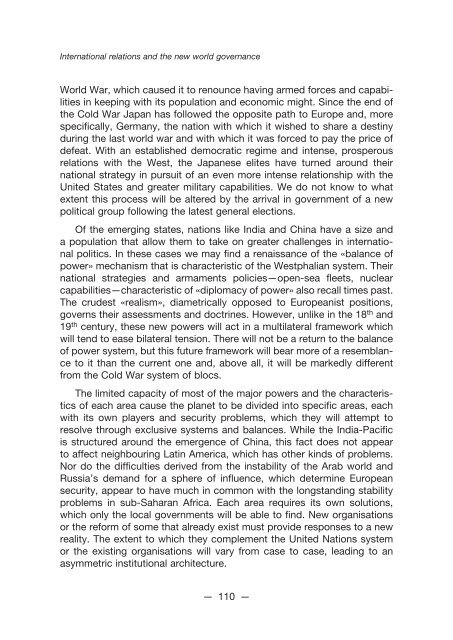Strategic Panorama 2009 - 2010 - IEEE
Strategic Panorama 2009 - 2010 - IEEE
Strategic Panorama 2009 - 2010 - IEEE
You also want an ePaper? Increase the reach of your titles
YUMPU automatically turns print PDFs into web optimized ePapers that Google loves.
International relations and the new world governance<br />
World War, which caused it to renounce having armed forces and capabilities<br />
in keeping with its population and economic might. Since the end of<br />
the Cold War Japan has followed the opposite path to Europe and, more<br />
specifically, Germany, the nation with which it wished to share a destiny<br />
during the last world war and with which it was forced to pay the price of<br />
defeat. With an established democratic regime and intense, prosperous<br />
relations with the West, the Japanese elites have turned around their<br />
national strategy in pursuit of an even more intense relationship with the<br />
United States and greater military capabilities. We do not know to what<br />
extent this process will be altered by the arrival in government of a new<br />
political group following the latest general elections.<br />
Of the emerging states, nations like India and China have a size and<br />
a population that allow them to take on greater challenges in international<br />
politics. In these cases we may find a renaissance of the «balance of<br />
power» mechanism that is characteristic of the Westphalian system. Their<br />
national strategies and armaments policies—open-sea fleets, nuclear<br />
capabilities—characteristic of «diplomacy of power» also recall times past.<br />
The crudest «realism», diametrically opposed to Europeanist positions,<br />
governs their assessments and doctrines. However, unlike in the 18 th and<br />
19 th century, these new powers will act in a multilateral framework which<br />
will tend to ease bilateral tension. There will not be a return to the balance<br />
of power system, but this future framework will bear more of a resemblance<br />
to it than the current one and, above all, it will be markedly different<br />
from the Cold War system of blocs.<br />
The limited capacity of most of the major powers and the characteristics<br />
of each area cause the planet to be divided into specific areas, each<br />
with its own players and security problems, which they will attempt to<br />
resolve through exclusive systems and balances. While the India-Pacific<br />
is structured around the emergence of China, this fact does not appear<br />
to affect neighbouring Latin America, which has other kinds of problems.<br />
Nor do the difficulties derived from the instability of the Arab world and<br />
Russia’s demand for a sphere of influence, which determine European<br />
security, appear to have much in common with the longstanding stability<br />
problems in sub-Saharan Africa. Each area requires its own solutions,<br />
which only the local governments will be able to find. New organisations<br />
or the reform of some that already exist must provide responses to a new<br />
reality. The extent to which they complement the United Nations system<br />
or the existing organisations will vary from case to case, leading to an<br />
asymmetric institutional architecture.<br />
— 110 —

















